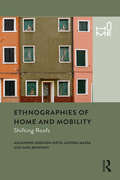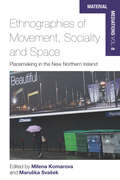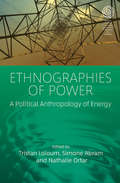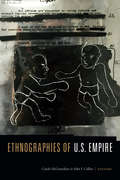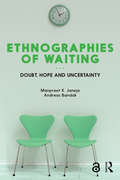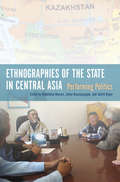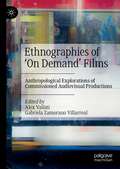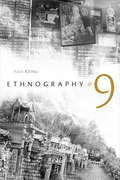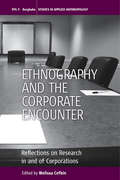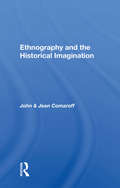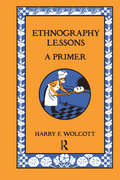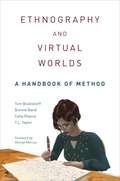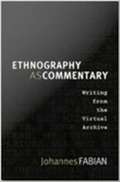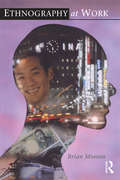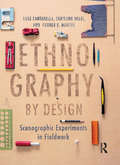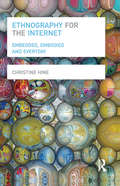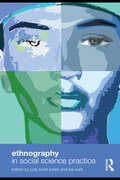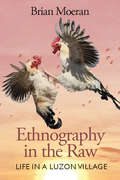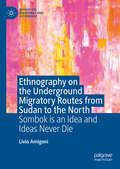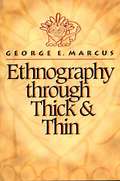- Table View
- List View
Ethnographies of Home and Mobility: Shifting Roofs (Home Ser.)
by Alejandro Miranda Nieto Aurora Massa Sara BonfantiThis book lays out a framework for understanding connections between home and mobility, and situates this within a multidisciplinary field of social research. The authors show how the idea of home offers a privileged entry point into forced migration, diversity and inequality. Using original fieldwork, they adopt an encompassing lens on labour, family and refugee flows, with cases of migrants from Latin America, Africa and the Indian subcontinent. With the book structured around these key topics, the authors look at how practices of home and mobility emerge along with emotions and manifold social processes. In doing so, their scope shifts from the household to streets, neighbourhoods, cities and even nations. Yet, the meaning of 'home' as a lived experience goes beyond place; the authors analyse literature on migration and mobility to reveal how the past and future are equally projected into imaginings of home.
Ethnographies of Movement, Sociality and Space: Place-Making in the New Northern Ireland (Material Mediations: People and Things in a World of Movement #8)
by Maruška Svašek Milena KomarovaExploring the complex dynamics of twenty-first century spatial sociality, this volume provides a much-needed multi-dimensional perspective that undermines the dominant image of Northern Ireland as a conflict-ridden place. Despite touching on memories of “the Troubles” and continuing unionist-nationalist tensions, the volume refuses to consider people in the region as purely political beings, or to understand processes of placemaking solely through ethnic or national contestations and territoriality. Topics such as the significance of friendship, gender, and popular culture in spatial practices are considered, against the backdrop of the growing presence of migrants, refugees and diasporic groups.
Ethnographies of Power: A Political Anthropology of Energy (EASA Series #42)
by Tristan Loloum, Simone Abram Nathalie OrtarEnergy related infrastructures are crucial to political organization. They shape the contours of states and international bodies, as well as corporations and communities, framing their material existence and their fears and idealisations of the future. Ethnographies of Power brings together ethnographic studies of contemporary entanglements of energy and political power. Revisiting classic anthropological notions of power, it asks how changing energy related infrastructures are implicated in the consolidation, extension or subversion of contemporary political regimes and discovers what they tell us about politics today.
Ethnographies of Social Support
by Markus Schlecker Friederike FleischerWhy do elderly choose to move away from their children so as to not receive their support? Using a number of case studies, contributors explore social support as a tool of mutuality, or maintaining relatedness and sharing feelings, rather than preventing or patching up problems. This book helps correct the dominant framework of deliberate action.
Ethnographies of U.S. Empire
by John F. Collins Carole McGranahanHow do we live in and with empire? The contributors to Ethnographies of U.S. Empire pursue this question by examining empire as an unequally shared present. Here empire stands as an entrenched, if often invisible, part of everyday life central to making and remaking a world in which it is too often presented as an aberration rather than as a structuring condition. This volume presents scholarship from across U.S. imperial formations: settler colonialism, overseas territories, communities impacted by U.S. military action or political intervention, Cold War alliances and fissures, and, most recently, new forms of U.S. empire after 9/11. From the Mohawk Nation, Korea, and the Philippines to Iraq and the hills of New Jersey, the contributors show how a methodological and theoretical commitment to ethnography sharpens all of our understandings of the novel and timeworn ways people live, thrive, and resist in the imperial present. Contributors: Kevin K. Birth, Joe Bryan, John F. Collins, Jean Dennison, Erin Fitz-Henry, Adriana María Garriga-López, Olívia Maria Gomes da Cunha, Matthew Gutmann, Ju Hui Judy Han, J. Kēhaulani Kauanui, Eleana Kim, Heonik Kwon, Soo Ah Kwon, Darryl Li, Catherine Lutz, Sunaina Maira, Carole McGranahan, Sean T. Mitchell, Jan M. Padios, Melissa Rosario, Audra Simpson, Ann Laura Stoler, Fa’anofo Lisaclaire Uperesa, David Vine
Ethnographies of Waiting: Doubt, Hope and Uncertainty (Criminal Practice Ser.)
by Manpreet K. Janeja Andreas BandakWe all wait – in traffic jams, passport offices, school meal queues, for better weather, an end to fighting, peace. Time spent waiting produces hope, boredom, anxiety, doubt, or uncertainty. Ethnographies of Waiting explores the social phenomenon of waiting and its centrality in human society. Using waiting as a central analytical category, the book investigates how waiting is negotiated in myriad ways. Examining the politics and poetics of waiting, Ethnographies of Waiting offers fresh perspectives on waiting as the uncertain interplay between doubting and hoping, and asks "When is time worth the wait?" Waiting thus conceived is intrinsic to the ethnographic method at the heart of the anthropological enterprise. Featuring detailed ethnographies from Japan, Georgia, England, Ghana, Norway, Russia and the United States, a Foreword by Craig Jeffrey and an Afterword by Ghassan Hage, this is a vital contribution to the field of anthropology of time and essential reading for students and scholars in anthropology, sociology and philosophy.
Ethnographies of the State in Central Asia
by Johan Rasanayagam Judith Beyer Madeleine ReevesWith fresh and provocative insights into the everyday reality of politics in post-Soviet Central Asia, this volume moves beyond commonplaces about strong and weak states to ask critical questions about how democracy, authority, and justice are understood in this important region. In conversation with current theories of state power, the contributions draw on extensive ethnographic research in settings that range from the local to the transnational, the mundane to the spectacular, to provide a unique perspective on how politics is performed in everyday life.
Ethnographies of ‘On Demand’ Films: Anthropological Explorations of Commissioned Audiovisual Productions
by Gabriela Zamorano Villarreal Alex VailatiOver the last two decades, the advent of cheap, user-friendly video technologies has contributed to a revolution in representational agency. Videos are now made by production units that are at times composed of families, churches, musical groups, community associations or other institutions. Thus, on-demand videos produced and distributed within local and atypical networks profoundly shape contemporary urban imaginaries. This book explores the intertwined relations among infrastructure, technology, and modernity through an ordinary, yet little studied field of "on-demand" audiovisual production, which involves processes of negotiation and interaction between clients and commissioned video makers. On-demand films are considered as a space of collaboration and self-representation, that allows to reflect on the potential of fiction, artifice, and montage to render material desires, aspirations, and ideas of the future.
Ethnography #9
by Alan KlimaAs Alan Klima writes in Ethnography #9, &“there are other possible starting places than the earnest realism of anthropological discourse as a method of critical thought.&” In this experimental ethnography of capitalism, ghosts, and numbers in mid- and late-twentieth-century Thailand, Klima uses this provocation to deconstruct naive faith in the &“real&” and in the material in academic discourse that does not recognize that it is, itself, writing. Klima also twists the common narrative that increasing financial abstractions in economic culture are a kind of real horror story, entangling it with other modes of abstraction commonly seen as less &“real,&” such as spirit consultations, ghost stories, and haunted gambling. His unconventional, distinctive, and literary form of storytelling uses multiple voices, from ethnographic modes to a first-person narrative in which he channels Northern Thai ghostly tales and the story of a young Thai spirit. This genre alchemy creates strange yet compelling new relations between being and not being, presence and absence, fiction and nonfiction, fantasy and reality. In embracing the speculative as a writing form, Klima summons unorthodox possibilities for truth in contemporary anthropology.
Ethnography And The Corporate Encounter
by Melissa CefkinBusinesses and other organizations are increasingly hiring anthropologists and other ethnographically-oriented social scientists as employees, consultants, and advisors. The nature of such work, as described in this volume, raises crucial questions about potential implications to disciplines of critical inquiry such as anthropology. In addressing these issues, the contributors explore how researchers encounter and engage sites of organizational practice in such roles as suppliers of consumer-insight for product design or marketing, or as advisors on work design or business and organizational strategies. The volume contributes to the emerging canon of corporate ethnography, appealing to practitioners who wish to advance their understanding of the practice of corporate ethnography and providing rich material to those interested in new applications of ethnographic work and the ongoing rethinking of the nature of ethnographic praxis.
Ethnography And The Historical Imagination
by Jean Comaroff John ComaroffOver the years John and Jean Comaroff have broadened the study of culture and society with their reflections on power and meaning. In their work on Africa and colonialism they have explored some of the fundamental questions of social science, delving into the nature of history and human agency, culture and consciousness, ritual and representation. How are human differences constructed and institutionalized, transformed and (sometimes) effaced, empowered and (sometimes) resisted? How do local cultures articulate with global forms? How is the power of some people over others built, sustained, eroded, and negated? How does the social imagination take shape in novel yet collectively meaningful ways? Addressing these questions, the essays in this volume–several never before published–work toward an "imaginative sociology," demonstrating the techniques by which social science may capture the contexts that human beings construct and inhabit. In the introduction, the authors offer their most complete statement to date on the nature of historical anthropology. Standing apart from the traditional disciplines of social history and modernist social science, their work is dedicated to discovering how human worlds are made and signified, forgotten and remade.
Ethnography Lessons: A Primer
by Harry F WolcottHarry Wolcott takes the reader inside the process of constructing an ethnographic study, offering a wealth of lessons from one of the masters. In this concise primer, he provides a set of models from which to organize a study, explains how to pick the various components that go into the ethnographic report, advises on how to create analogies and metaphors to help explain your work, and identifies the key features of an effective ethnography. He also discusses the role of serendipity and questions of ethics in doing ethnographic work. Learn the essentials of ethnography from one of the masters.
Ethnography and Virtual Worlds: A Handbook of Method
by Tom Boellstorff Celia Pearce Bonnie Nardi T. L. TaylorA practical guide to the ethnographic study of online virtual worldsEthnography and Virtual Worlds is the only book of its kind—a concise, comprehensive, and practical guide for students, teachers, designers, and scholars interested in using ethnographic methods to study online virtual worlds, including both game and nongame environments. Written by leading ethnographers of virtual worlds, and focusing on the key method of participant observation, the book provides invaluable advice, tips, guidelines, and principles to aid researchers through every stage of a project, from choosing an online fieldsite to writing and publishing the results.Provides practical and detailed techniques for ethnographic research customized to reflect the specific issues of online virtual worlds, both game and nongameDraws on research in a range of virtual worlds, including Everquest, Second Life, There.com, and World of WarcraftProvides suggestions for dealing with institutional review boards, human subjects protocols, and ethical issuesGuides the reader through the full trajectory of ethnographic research, from research design to data collection, data analysis, and writing up and publishing research resultsAddresses myths and misunderstandings about ethnographic research, and argues for the scientific value of ethnography
Ethnography and Virtual Worlds: A Handbook of Method, Updated Edition
by Tom Boellstorff Celia Pearce Bonnie Nardi T. L. TaylorA practical guide to the ethnographic study of online cultures, and beyondEthnography and Virtual Worlds is the only book of its kind—a concise, comprehensive, and practical guide for students, teachers, designers, and scholars interested in using ethnographic methods to study online virtual worlds, including both game and nongame environments. Written by leading ethnographers of virtual worlds, and focusing on the key method of participant observation, the book provides invaluable advice, tips, guidelines, and principles to aid researchers through every stage of a project, from choosing an online fieldsite to writing and publishing the results.Provides practical and detailed techniques for ethnographic research customized to reflect the specific issues of online virtual worlds, both game and nongameDraws on research in a range of virtual worlds, including Everquest, Second Life, There.com, and World of WarcraftProvides suggestions for dealing with institutional review boards, human subjects protocols, and ethical issuesGuides the reader through the full trajectory of ethnographic research, from research design to data collection, data analysis, and writing up and publishing research resultsAddresses myths and misunderstandings about ethnographic research, and argues for the scientific value of ethnography
Ethnography as Commentary: Writing from the Virtual Archive
by Johannes FabianThe Internet allows ethnographers to deposit the textual materials on which they base their writing in virtual archives. Electronically archived fieldwork documents can be accessed at any time by the writer, his or her readers, and the people studied. Johannes Fabian, a leading theorist of anthropological practice, argues that virtual archives have the potential to shift the emphasis in ethnographic writing from the monograph to commentary. In this insightful study, he returns to the recording of a conversation he had with a ritual healer in the Congolese town of Lubumbashi more than three decades ago. Fabian's transcript and translation of the exchange have been deposited on a website (Language and Popular Culture in Africa), and in Ethnography as Commentary he provides a model of writing in the presence of a virtual archive. In his commentary, Fabian reconstructs his meeting with the healer Kahenga Mukonkwa Michel, in which the two discussed the ritual that Kahenga performed to protect Fabian's home from burglary. Fabian reflects on the expectations and terminology that shape his description of Kahenga's ritual and meditates on how ethnographic texts are made, considering the settings, the participants, the technologies, and the linguistic medium that influence the transcription and translation of a recording and thus fashion ethnographic knowledge. Turning more directly to Kahenga--as a practitioner, a person, and an ethnographic subject--and to the questions posed to him, Fabian reconsiders questions of ethnic identity, politics, and religion. While Fabian hopes that emerging anthropologists will share their fieldwork through virtual archives, he does not suggest that traditional ethnography will disappear. It will become part of a broader project facilitated by new media.
Ethnography at Work
by Brian MoeranEthnography at Work follows the experiences of the author as a participant observer in the day-to-day running of a Japanese advertising agency. The book reveals the intricate behind-the-scenes planning, discussion, negotiations and strategies needed to ensure that the agency's presentation to a potential client will be preferred over that of a rival firm. The book shows how detailed ethnography can lead to an understanding of numerous different, but interlocking, theoretical issues. It demonstrates how ethnography can travel beyond the academic realm and be used by business personnel to heighten their understanding of their companies' organizational structures, strategies and daily work practices. Asking crucial questions about the role of the anthropologist in the field, Ethnography at Work introduces students to ways in which anthropologists study social systems in business.
Ethnography by Design: Scenographic Experiments in Fieldwork (Criminal Practice Ser.)
by George E. Marcus Christine Hegel Luke CantarellaEthnography by Design, unlike many investigations into how ethnography can be done, focuses on the benefits of sustained collaboration across projects to ethnographic enquiry, and the possibilities of experimental co-design as part of field research. The book translates specifically scenic design practices, which include processes like speculation, materialization, and iteration, and applies them to ethnographic inquiry, emphasizing both the value of design studio processes and "designed" field encounters. The authors make it clear that design studio practices allow ethnographers to ask and develop very different questions within their own and others' research and thus, design also offers a framework for shaping the conditions of encounter in ways that make anthropological suppositions tangible and visually apparent. Written by two anthropologists and a designer, and based on their experience of their collective endeavours during three projects, Luke Cantarella, Christine Hegel, and George E. Marcus examine their works as a way to continue a broader inquiry into what the practice of ethnography can be in the twenty-first century, and how any project distinctively moves beyond standard perspectives through its crafted modes of participation and engagement.
Ethnography for the Internet: Embedded, Embodied and Everyday (Criminal Practice Ser.)
by Christine HineThe internet has become embedded into our daily lives, no longer an esoteric phenomenon, but instead an unremarkable way of carrying out our interactions with one another. Online and offline are interwoven in everyday experience. Using the internet has become accepted as a way of being present in the world, rather than a means of accessing some discrete virtual domain. Ethnographers of these contemporary Internet-infused societies consequently find themselves facing serious methodological dilemmas: where should they go, what should they do there and how can they acquire robust knowledge about what people do in, through and with the internet? This book presents an overview of the challenges faced by ethnographers who wish to understand activities that involve the internet. Suitable for both new and experienced ethnographers, it explores both methodological principles and practical strategies for coming to terms with the definition of field sites, the connections between online and offline and the changing nature of embodied experience. Examples are drawn from a wide range of settings, including ethnographies of scientific institutions, television, social media and locally based gift-giving networks.
Ethnography in Social Science Practice
by Sal Watt Julie Scott-JonesEthnography in Social Science Practice explores ethnography’s increasing use across the social sciences, beyond its traditional bases in social anthropology and sociology. It explores the disciplinary roots of ethnographic research within social anthropology, and contextualizes it within both field and disciplinary settings. The book is of two parts: Part one places ethnography as a methodology in its historical, ethical and disciplinary context, and also discusses the increasing popularity of ethnography across the social sciences. Part two explores the stages of ethnographic research via a selection of multidisciplinary case studies. A number of key questions are explored: What exactly is ethnographic research and what makes it different from other qualitative approaches? Why did ethnography emerge within one social science discipline and not others? Why did its adoption across the social sciences prove problematic? What are the methodological advantages and disadvantages of doing ethnographic research? Why are ethnographers so concerned by issues of ethics, politics, representation and power? What does ethnography look like within different social science disciplines? The book is aimed at social science students at both undergraduate and postgraduate level and each chapter has pedagogic features, including reflective activities and suggested further readings for students.
Ethnography in Today's World
by Roger SanjekIn Ethnography in Today's World, Roger Sanjek examines the genre and practice of ethnography from a historical perspective, from its nineteenth-century beginnings and early twentieth-century consolidation, through political reorientations during the 1960s and the impact of feminism and postmodernism in later decades, to its current outlook in an increasingly urban world. Drawing on a career of ethnographic research across Brazil, Ghana, New York City, and with the Gray Panthers, Sanjek probes politics and rituals in multiethnic New York, the dynamics of activist meetings, human migration through the ages, and shifting conceptions of race in the United States. He interrogates well-known works from Boas, Whyte, Fabian, Geertz, Marcus, and Clifford, as well as less celebrated researchers, addressing methodological concerns from ethnographers' reliance on assistants in the formative days of the discipline to contemporary comparative issues and fieldwork and writing strategies.Ethnography in Today's World contributes to our understanding of culture and society in an age of globalization. These provocative examinations of the value of ethnographic research challenge conventional views as to how ethnographic fieldwork is and can be conceived, conducted, contextualized, and communicated to academic audiences and the twenty-first-century public.
Ethnography in the Raw: Life in a Luzon Village
by Brian MoeranEthnography in the Raw describes the author’s encounters with the Philippine family into which he has married, his wife’s friends and acquaintances, and their lives in a remote rural village in the rice basin of Luzon, about 130 miles northeast of Manila. The book links detailed descriptions of his Philippine family with cultural practices such as circumcision, marriage and cockfights combined with theoretical musings on the concepts of sacrifice, social exchange, patron-client relations, food, and religious symbolism. It is both anthropological fieldwork ‘in the raw,’ and an incisive analysis of contemporary Philippine society and culture.
Ethnography in the Raw: Life in a Luzon Village
by Brian MoeranEthnography in the Raw describes the author’s encounters with the Philippine family into which he has married, his wife’s friends and acquaintances, and their lives in a remote rural village in the rice basin of Luzon, about 130 miles northeast of Manila. The book links detailed descriptions of his Philippine family with cultural practices such as circumcision, marriage and cockfights combined with theoretical musings on the concepts of sacrifice, social exchange, patron-client relations, food, and religious symbolism. It is both anthropological fieldwork ‘in the raw,’ and an incisive analysis of contemporary Philippine society and culture.
Ethnography on the Underground Migratory Routes from Sudan to the North: Sombok Is an Idea and Ideas Never Die (Migration, Diasporas and Citizenship)
by Livio AmigoniThis book uses an ethnography of the migratory route from Sudan to the EU to understand how undocumented migration experiences take place and breed underground forms of mobilities and survival strategies. It pays particular attention to the production, circulation and resilience of migratory knowledge in transnational networks and how those produce and sustain specific mobility practices. The related research questions focus on: how and which narratives and popular imaginations circulate and foster high-risk journeys towards Europe, referred to as sombok; understanding how these kind of journeys are interpreted and framed according to gender, religion and family traditions; discerning how border regimes produce specific migration careers, decision making processes and forms of resistance and cooperation with other actors; how the figure of the smuggler is framed by people on the move and how one group of smugglers interpret their activities at the Ventimiglia border; and how the practices of homing on the move and solidarity housing experiences take place and prop underground routes. This book will be of interest to scholars of migration.
Ethnography through Thick and Thin
by George E. MarcusIn the 1980s, George Marcus spearheaded a major critique of cultural anthropology, expressed most clearly in the landmark book Writing Culture, which he coedited with James Clifford. Ethnography through Thick and Thin updates and advances that critique for the late 1990s. Marcus presents a series of penetrating and provocative essays on the changes that continue to sweep across anthropology. He examines, in particular, how the discipline's central practice of ethnography has been changed by "multi-sited" approaches to anthropology and how new research patterns are transforming anthropologists' careers. Marcus rejects the view, often expressed, that these changes are undermining anthropology. The combination of traditional ethnography with scholarly experimentation, he argues, will only make the discipline more lively and diverse.The book is divided into three main parts. In the first, Marcus shows how ethnographers' tradition of defining fieldwork in terms of peoples and places is now being challenged by the need to study culture by exploring connections, parallels, and contrasts among a variety of often seemingly incommensurate sites. The second part illustrates this emergent multi-sited condition of research by reflecting it in some of Marcus's own past research on Tongan elites and dynastic American fortunes. In the final section, which includes the previously unpublished essay "Sticking with Ethnography through Thick and Thin," Marcus examines the evolving professional culture of anthropology and the predicaments of its new scholars. He shows how students have increasingly been drawn to the field as much by such powerful interdisciplinary movements as feminism, postcolonial studies, and cultural studies as by anthropology's own traditions. He also considers the impact of demographic changes within the discipline--in particular the fact that anthropologists are no longer almost exclusively Euro-Americans studying non-Euro-Americans. These changes raise new issues about the identities of anthropologists in relation to those they study, and indeed, about what is to define standards of ethnographic scholarship.Filled with keen and highly illuminating observations, Ethnography through Thick and Thin will stimulate fresh debate about the past, present, and future of a discipline undergoing profound transformations.
Ethnography, Superdiversity and Linguistic Landscapes
by Jan BlommaertSuperdiversity has rendered familiar places, groups and practices extraordinarily complex, and the traditional tools of analysis need rethinking. In this book, Jan Blommaert investigates his own neighbourhood in Antwerp, Belgium, from a complexity perspective. Using an innovative approach to linguistic landscaping, he demonstrates how multilingual signs can be read as chronicles documenting the complex histories of a place. The book can be read in many ways: as a theoretical and methodological contribution to the study of linguistic landscape; as one of the first monographs which addresses the sociolinguistics of superdiversity; or as a revision of some of the fundamental assumptions of social science through the use of chaos and complexity theory as an inspiration for understanding the structures of contemporary social life.
